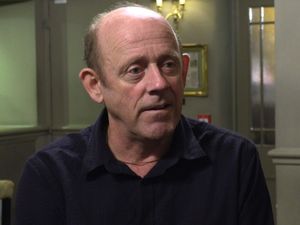Mountaineer Simon Yates: Touching The Void is a feelgood story
He and Joe Simpson scaled the Siula Grande in 1985.

Mountaineer Simon Yates believes Touching The Void is a “feelgood story”.
Yates has lost friends to the pursuit of peaks, and more than 30 years on from a disastrous descent, feels any avoidance of death is a lucky escape.
The veteran British climber severed a rope supporting injured partner Joe Simpson during an infamous scaling of Peruvian mountain Siula Grande in 1985, plunging him into the abyss and beginning a survival epic.
Yates’s decision to cut the bond, which was “not a particularly emotional moment”, has been immortalised in a memoir by Simpson, a film, and a play now running in the West End.
Simpson crawled to life across a glacier, and his former climbing partner has called the close encounter with “the void” an uplifting tale.
Yates has known fellow mountaineers who have tragically been unable to cheat death in the same way.
“It is a feelgood story,” he told the PA news agency at the Duke of York’s Theatre in London, where a play based on the climb is running.
“It all works out in the end. I think we were very lucky. We got away with it. Some people don’t. That’s very sad when it happens.
“Sadly I’ve had a number of friends who’ve died over the years, and even just this last year a number of people I’ve known. There seems to have been a bit of a rash of deaths again.
“If you do have an accident and get away with it, you have ultimately been very lucky.”
Yates, who was 21 at the time of the incident, said he received no censure from the climbing community for his decision to sever the rope, after bravely supporting the weight of his climbing partner, whose leg had been broken in a fall.
He was “bemused” by the reaction of the public to his decision, saying that the symbolism attached to the severed rope and the fall are not as emotive in climbing circles, governed by their own ethics and pragmatism.
Yates said: “People see the rope as some sort of metaphor, a bond, the friendship thing, ‘You can’t possibly cut this bond’.
“In many ways, in terms of mountaineering, it’s by no means unique. There are a lot of mountaineering epics that the public never hear about.
“We don’t actually have a code as such, but we do have a sort of unwritten series of ethics. They’re kind of fluid. People are always discussing these things.
“I’ve never actually had any problems from other mountaineers.”
Yates has been involved in 75 expeditions since the 1985 incident, and does not remember vividly the crucial moments of his worst climb.
But he recalls that fear struck him when Simpson broke his leg on their descent, though after supporting his suspended body over the precipice for an hour, he said cutting the rope on what he believed was his dead partner was not very emotional.
“It’s hard to put it in words,” he said of finally being reunited with the friend he thought was dead.
“There were so many emotions running simultaneously, it was emotional overload really.
“You’ve got joy, incredible joy and happiness, then there’s this sadness because of the condition that Joe’s in, maybe a little bit of guilt in there.”
The emotions are brought to life on stage at the Duke of York’s Theatre, where Warhorse director Tom Morris oversees a retelling of the survival tale.
It is based on the best-selling memoir by Simpson released in 1988.
The play is written by David Greig and runs into February 2020.





